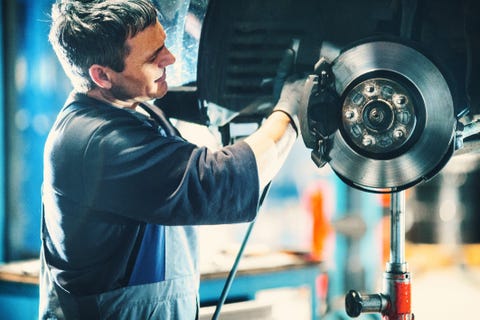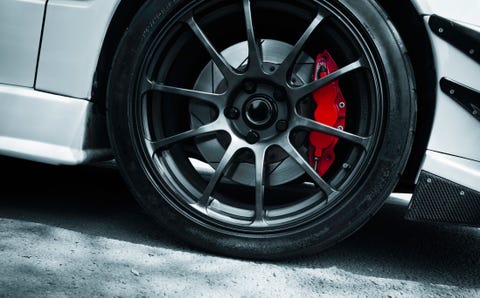How To Get Brakes To Stop Squeaking
If you're contending with squeaky brakes you might be wondering if it's safe to drive with them, how much it'll cost to fix them, and how to remedy the issue. We've got the answers to all your squeaky brake woes, let's get started.
First, it's good to identify the cause of the squeak. You should know that all brakes make some noise sometimes and that the occasional squeak isn't a problem. A squeaky brake can stop a car just like a silent one can. Most modern brakes use a cast-iron disc squeezed between two brake pads lined with friction material. Some higher-end vehicles use pricey carbon-ceramic discs or even special tungsten carbide coatings on the disc, but your average commuter is going to use big discs of steel.
Under the right conditions, the disc, the pads, and the caliper they're mounted in can start to vibrate in exactly the same way a violin string vibrates when stroked by the instrument's bow. Most brake squeals occur at a single discrete frequency. The speed of the vehicle and how hard you press down on the left pedal will only change the volume of noise, as the pitch is controlled by the stiffness and mass of the pad and disc.
Inadequate development at the manufacturer level that leaves brake systems prone to noise can usually be overcome by a Saturday mechanic without totally re-engineering the entire system. We can try to damp out the noise, or simply change the resonant frequency of the whole arrangement until it stops singing in any audible frequency. Here's how.
Normal Brake Pad Noises

gilaxia Getty Images
Many brake pads will make a swishing or grinding noise for the first few stops in the morning until the pads warm up and shed any moisture they've accumulated overnight. That hissing or grinding noise on some rainy or dewy mornings is often just the pads sweeping off a thin film of rust that formed on the iron discs, and that's perfectly normal.
The brake pad compound itself can also make some noise. In the past, brake pad friction material contained a lot of asbestos. Asbestos was also highly cancerous to those who worked with it, so the industry has almost completely switched to less dangerous alternatives. Kevlar is one material that's frequently used, but it tends to be dusty.
Today's cars are heavier thanks to ever-increasing safety requirements and a bevy of new features customers want. The need to slow down heavier cars led to the rise of metallics and ceramics in brake pads' friction material. Unfortunately, these can make brakes hiss or even grind a little as you slow down. It's a small price to pay for increased performance.
So all pad noise is fine, right? Hold up there, Sparky, there's one brake noise you need to pay attention to right away.
Many brake pads have a small finger of spring steel called a wear indicator that will scrape on the disc as the pad reaches its wear limit. This sound tells you that it's time to change pads for fresh, thicker ones before the friction material wears completely away. Let it go for too long, and you'll be trying to grip your metal rotors using the metal backing plates of your pads, which aren't very grippy at all and will damage your brake rotor. Don't write this off as a different kind of brake squeal.
The wear indicator makes more of a ripping-sheet-metal noise, not the single, high-pitched note of a harmless (but irritating) squeak.
Stop the Squeak

4X-image Getty Images
Okay, let's dig in and silence our brake noise. One fix is to simply use a different type of friction material. Manufacturers balance a number of priorities when choosing what brake pads to use on your car, including pad life, noise, grip, dust creation, and price. Changing to an aftermarket metallic or ceramic pad can change the resonant frequency of the pad and disc and thus, literally change its tune. Many aftermarket pads are designed specifically for certain desirable characteristics, such as low noise or low dust.
If you still have plenty of pad material remaining and don't want to drop fifty or a hundred bucks on a fresh set, you may be able to decouple the brake piston acoustically from the pad by purchasing shims made of Teflon. These fit between the pad and the brake caliper's hydraulic piston. I've tried these shims with middling success—sometimes they work and sometimes they don't.
We chose high-end ceramic-based pads for our brake job, hoping the different friction characteristics would cure the squeal. Surprise, the new pads came out of the box fitted with Teflon-coated shims already installed.
However, some calipers don't have enough extra travel in the piston bore to allow any shimming without making the brakes drag, particularly when you have fresh, unworn pads. If this is the case or if the shims simply didn't work, you can achieve a similar acoustic decoupling by simply coating the back face of the pad's backing plates with high-temperature brake grease or anti-seize compound. Unlike shims, this tweak won't last forever, as water and road dirt will wash it away eventually.
That being said, we wouldn't recommend the simple aerosols that you spray onto the pad's friction material. I have no idea if they actually make the squeak go away, because I'm unwilling to try anything that changes the friction characteristics of the pad. Let's not forget that the reason your brake system exists is to make your car slow down. Anything that could reduce that system's effectiveness in any way is an inherently bad idea.
Furthermore, both the brake pad and the brake rotor are wear items whose surfaces grind away over time, and your spray-on fix will grind off with it.
A Sticky Solution
Our favorite tweak for squeaks relies on a different principle: Instead of using shims or lubricants to decouple the pad from the caliper, stick the brake pad's backing plate to the piston or caliper housing, effectively making its mass far larger. That moves the system's resonant frequency out of the range that squeals.
A smear of Super Glue won't work for this. You need something that will withstand the water, salt, filth, and especially the heat that cars see in hard everyday use. How hot do brake systems get? I've seen brake discs glowing bright orange at the bottom of Pikes Peak and flames shooting out of the brake drums of trucks descending Donner Pass. The brakes on my own race car visibly glow right after a few hot laps.

CRC 05016 Disc Brake Quiet - 4 Fl Oz.
I've used several products for this over the years, but they're all basically anaerobic adhesives that are applied as either a lipstick-style film or a toothpaste-style goo. The application of this product is simple: Remove and clean up the old pads, or use new pads. Clean the area on the piston and caliper where the brake pad backing plate touches. Apply the anti-squeal adhesive to the piston, reinstall the pads and reassemble your brakes. These anaerobic products will stay gummy until you apply the brakes and squeeze out the oxygen. Then they stick like glue.
Whenever you're installing any brake parts, be sure you remove any corrosion or road dirt from the mating parts. The brake pad and piston need to be able to slide in and out to work properly, especially as your pads and rotors wear down. You may need brake cleaner, a wire brush or a file to clean up any sliding parts, but you need to be able to make sure nothing will seize up your caliper and cause it to drag. If you can't strong-man the piston back into the caliper with your bare hands, try pushing it back in using a C-clamp with an old brake pad or a small chunk of wood between the clamp and the piston. If it or any other part doesn't move right or is excessively corroded, replace it—hey, it's cheap insurance.
Apply a thin film of high-temp brake grease to any sliding surfaces while you're in there, too, as well-lubricated parts make much less noise. Avoid getting anything like grease or anti-seize on the pad or disc, and clean any greasy handprints off the disc surface before you reinstall your wheels.
Stef Schrader Stef Schrader routinely breaks and attempts to take project cars on race tracks.
This content is created and maintained by a third party, and imported onto this page to help users provide their email addresses. You may be able to find more information about this and similar content at piano.io
How To Get Brakes To Stop Squeaking
Source: https://www.popularmechanics.com/cars/car-technology/a3092/fix-squeaky-brakes/#:~:text=Clean%20the%20area%20on%20the,Then%20they%20stick%20like%20glue.
Posted by: moakwithet.blogspot.com

0 Response to "How To Get Brakes To Stop Squeaking"
Post a Comment